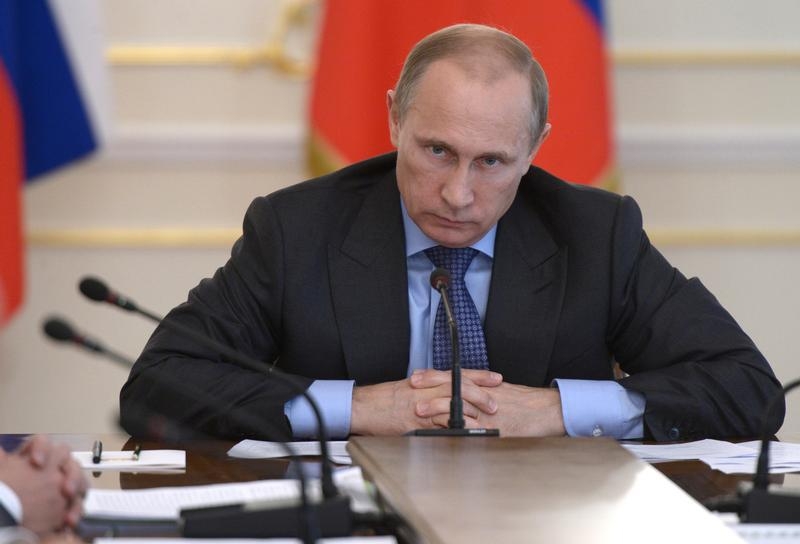First of all, let’s get this straight: The Russian Federation of 2016 is not the Soviet Union of 1986. True, it covers most of the same territory and is run by some of the same thugs. But the Marxist ideology is gone, and so is the superpower status. We’re talking about a more or less ordinary corrupt petrostate here, although admittedly a big one that happens to have nukes.
I mention all of this because Donald Trump’s effusive praise for Vladimir Putin — which actually reflects a fairly common sentiment on the right — seems to have confused some people.
On one side, some express puzzlement over the spectacle of right-wingers — the kind of people who used to yell “America, love it or leave it!” — praising a Russian regime. On the other side, a few people on the left are anti-anti-Putinists, denouncing criticism of Mr. Trump’s Putin-love as “red-baiting.” But today’s Russia isn’t Communist, or even leftist; it’s just an authoritarian state, with a cult of personality around its strongman, that showers benefits on an immensely wealthy oligarchy while brutally suppressing opposition and criticism.
And that, of course, is what many on the right admire.
Am I being unfair? Could praise for Russia’s de facto dictator reflect appreciation of his substantive achievements? Well, let’s talk about what the Putin regime has, in fact, accomplished, starting with economics.
Mr. Putin came to power at the end of 1999, as Russia was recovering from a severe financial crisis, and his first eight years were marked by rapid economic growth. This growth can, however, be explained with just one word: oil.
For Russia is, as I said, a petrostate: Fuels account for more than two-thirds of its exports, manufactures barely a fifth. And oil prices more than tripled between early 1999 and 2000; a few years later they more than tripled again. Then they plunged, and so did the Russian economy, which has done very badly in the past few years.
Mr. Putin would actually have something to boast about if he had managed to diversify Russia’s exports. And this should have been possible: The old regime left behind a large cadre of highly skilled workers. In fact, Russian émigrés have been a key force behind Israel’s remarkable technology boom — and the Putin government appears to have no trouble recruiting talented hackers to break into Democratic National Committee files. But Russia wasn’t going to realize its technology potential under a regime where business success depends mainly on political connections.
So Mr. Putin’s economic management is nothing to write home about. What about other aspects of his leadership?
Russia does, of course, have a big military, which it has used to annex Crimea and support rebels in eastern Ukraine. But this muscle-flexing has made Russia weaker, not stronger. Crimea, in particular, isn’t much of a conquest: it’s a territory with fewer people than either Queens or Brooklyn, and in economic terms it’s a liability rather than an asset, since the Russian takeover has undermined tourism, its previous mainstay.
An aside: Weirdly, some people think there’s a contradiction between Democratic mocking of the Trump/Putin bromance and President Obama’s mocking of Mitt Romney, four years ago, for calling Russia our “No. 1 geopolitical foe.” But there isn’t: Russia has a horrible regime, but as Mr. Obama said, it’s a “regional power,” not a superpower like the old Soviet Union.
Finally, what about soft power, the ability to persuade through the attractiveness of one’s culture and values? Russia has very little — except, maybe, among right-wingers who find Mr. Putin’s macho posturing and ruthlessness attractive.
Which brings us back to the significance of the Putin cult, and the way this cult has been eagerly joined by the Republican nominee for president.
There are good reasons to worry about Mr. Trump’s personal connections to the Putin regime (or to oligarchs close to that regime, which is effectively the same thing.) How crucial has Russian money been in sustaining Mr. Trump’s ramshackle business empire? There are hints that it may have been very important indeed, but given Mr. Trump’s secretiveness and his refusal to release his taxes, nobody really knows.
Beyond that, however, admiring Mr. Putin means admiring someone who has contempt for democracy and civil liberties. Or more accurately, it means admiring someone precisely because of that contempt.
When Mr. Trump and others praise Mr. Putin as a “strong leader,” they don’t mean that he has made Russia great again, because he hasn’t. He has accomplished little on the economic front, and his conquests, such as they are, are fairly pitiful. What he has done, however, is crush his domestic rivals: Oppose the Putin regime, and you’re likely to end up imprisoned or dead. Strong!
(The New York Times)
